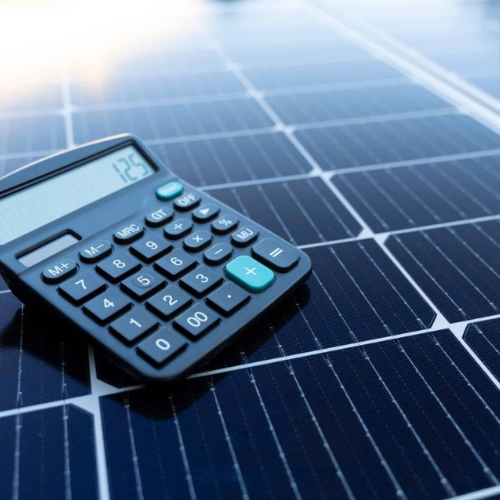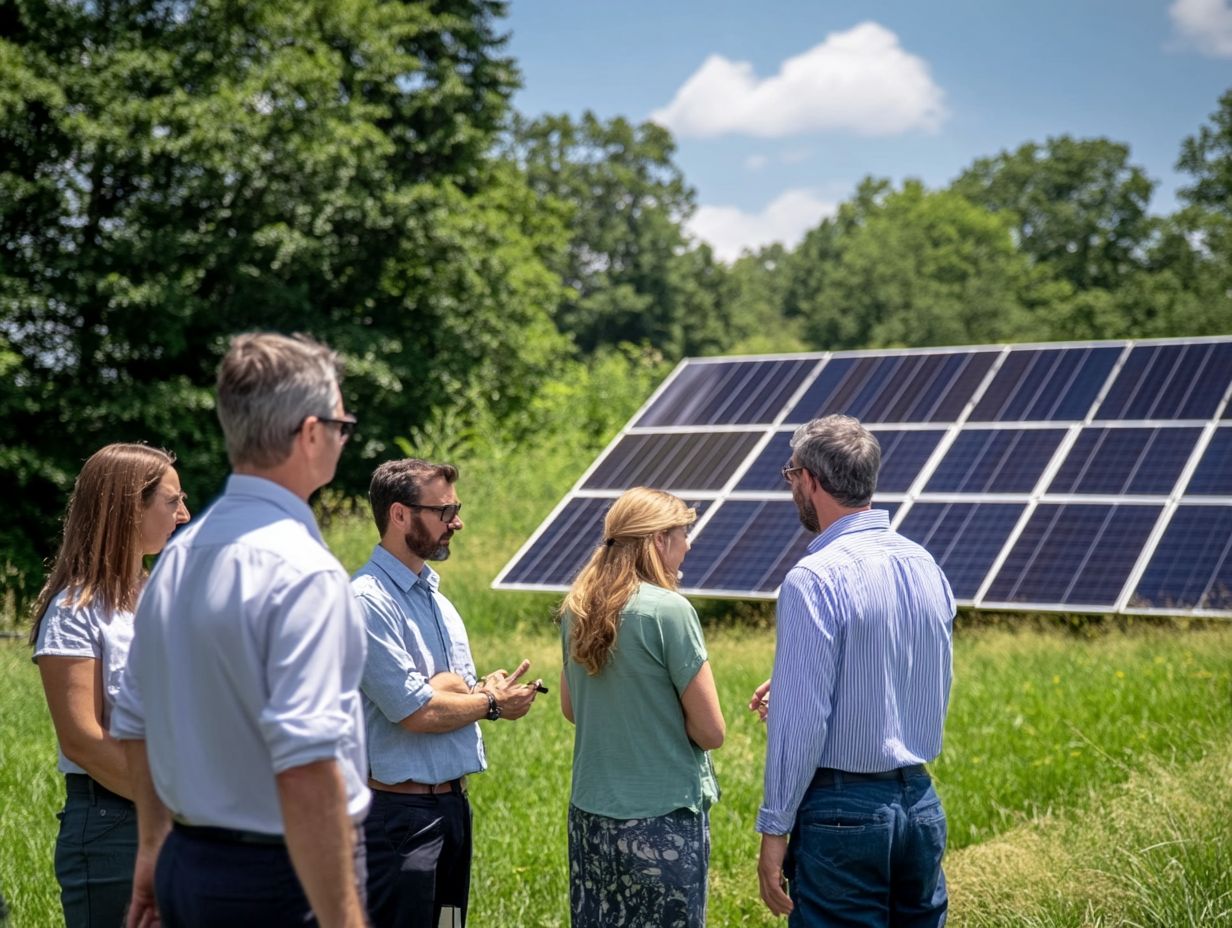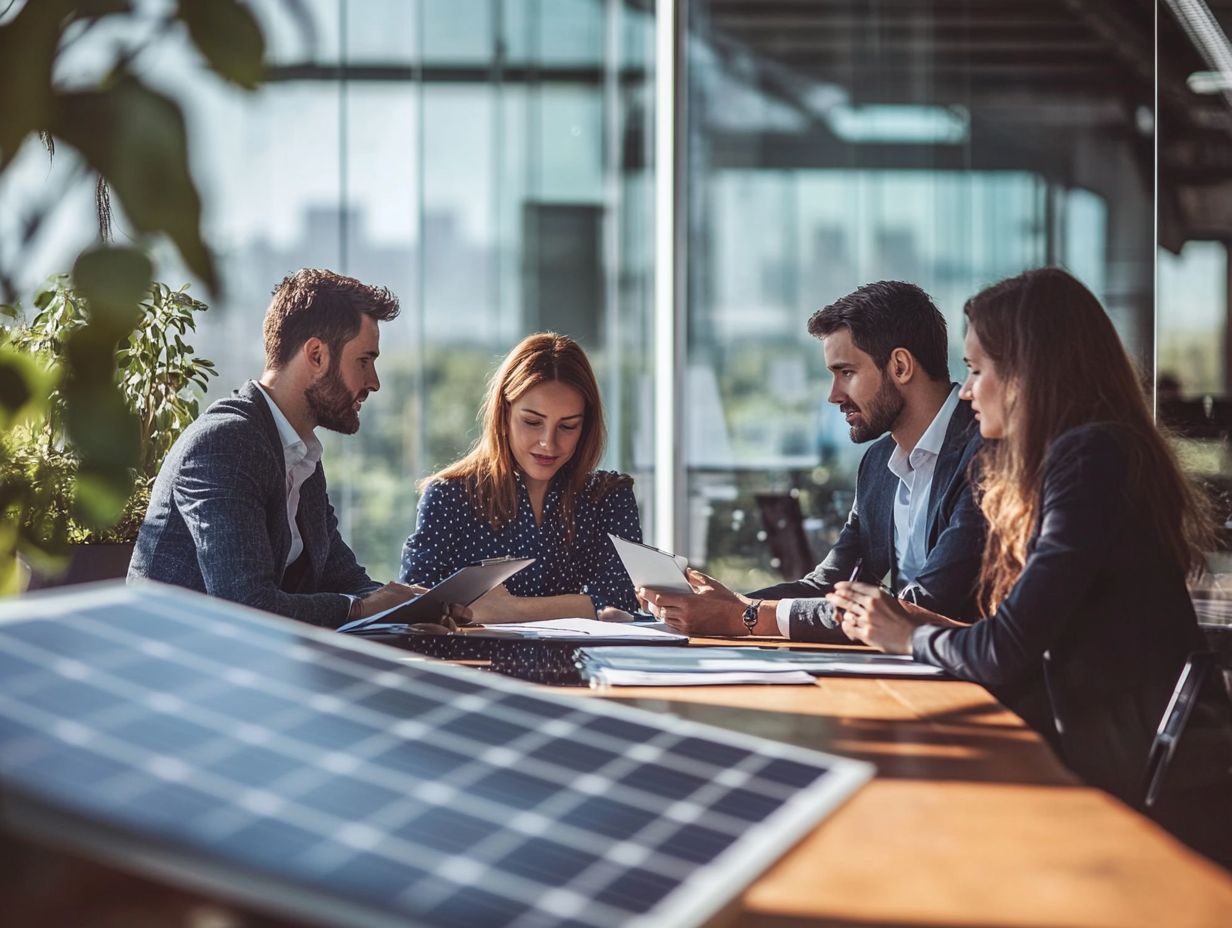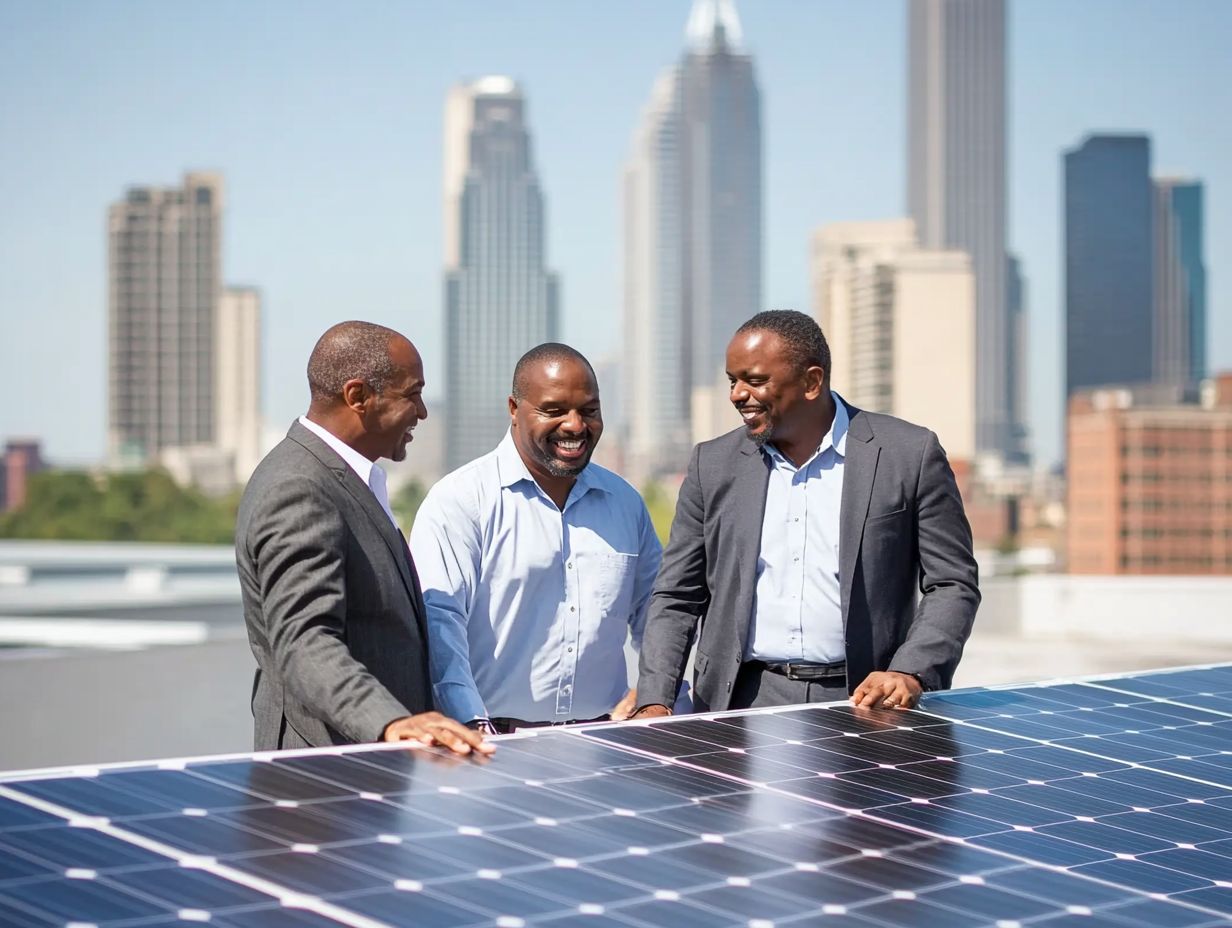Contents
- 1 Understanding the Financial Aspects of Solar Panel Installations
- 2 Overview of Solar Panel Financing
- 3 Solar Panel Loans
- 4 Solar Panel Leases
- 5 Power Purchase Agreements (PPAs)
- 6 Factors to Consider When Choosing a Financing Option
- 7 Essential Tips for Financing Solar Panels
- 8 Frequently Asked Questions About Solar Financing
Understanding the Financial Aspects of Solar Panel Installations
As the world shifts towards renewable energy, you might be thinking about solar panels to cut down on your carbon footprint and energy costs.
The initial investment can feel a bit overwhelming, but don’t worry. This article breaks down the financing options available to you—like solar loans, leases, and Power Purchase Agreements (PPAs)—so you can make an informed decision.
You’ll get a look at how each option works, along with their pros and cons, plus some essential factors to consider. This way, you can find the best way to harness solar energy effectively.
Overview of Solar Panel Financing
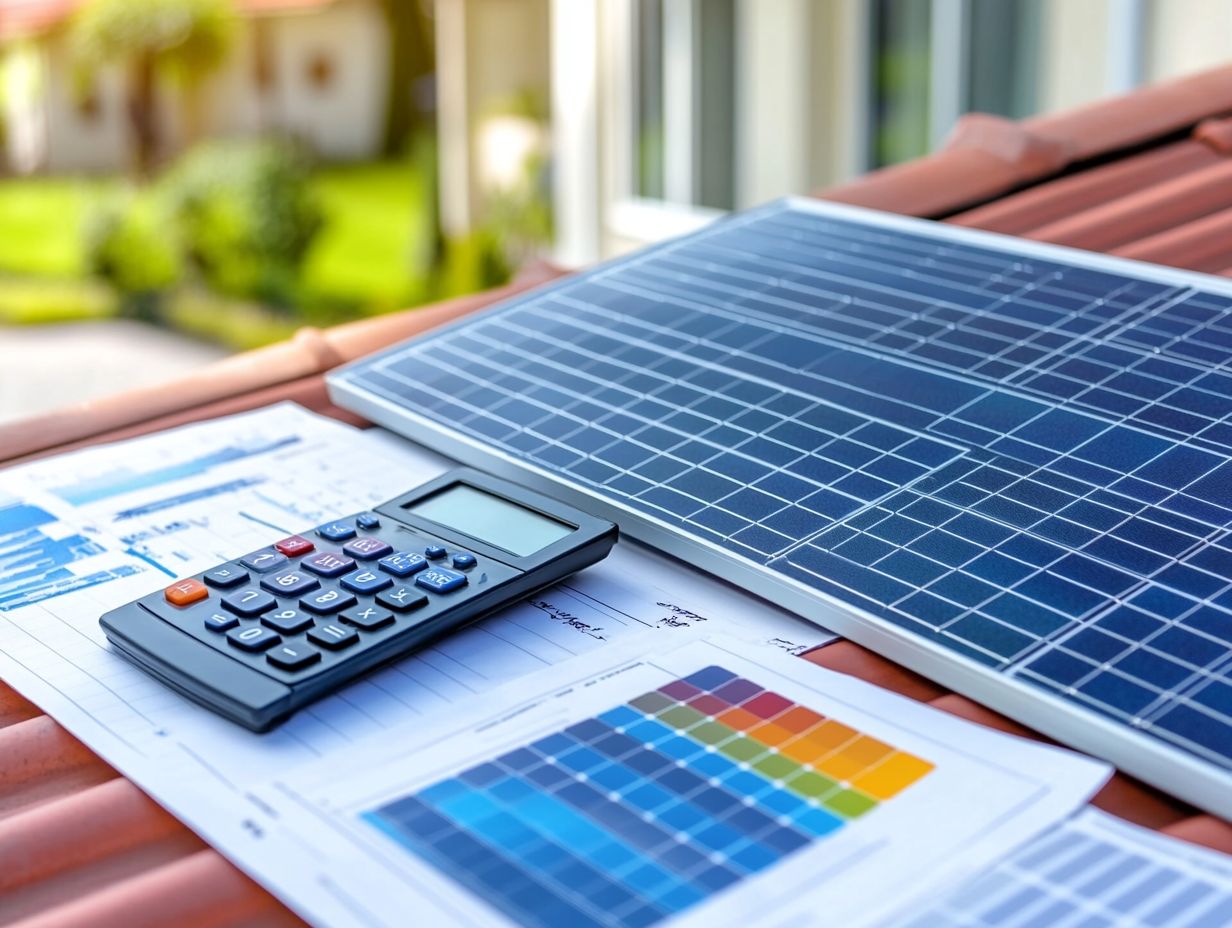
Solar panel financing is a crucial step in making the switch to renewable energy, allowing you to invest in solar power systems without the hassle of upfront costs and understanding the solar market trends.
There are plenty of financing options out there, like solar loans, leases, and Power Purchase Agreements (PPAs). Getting a grasp on these financing alternatives can lead to some serious savings on your utility bills and provide long-term financial benefits.
In this overview, you’ll explore the different types of financing available for solar panel installations, such as leases vs buy options, and see how they contribute to clean energy investments and help support energy independence.
Understanding the Different Options
Exploring the advantages and structures of solar panel loans. Regarding financing solar projects, you’ve got a few options to consider, each with its own unique structure and benefits, such as solar incentives programs and government grants.
- Solar panel loans let you buy the system outright through a cash purchase, while solar leases allow you to enjoy solar energy without actually owning the panels.
- Then there are power purchase agreements (PPAs), where you pay for the energy produced by the solar system instead of the system itself.
Understanding these financing options can really impact your budget and energy savings over time. With solar loans, you can benefit from various tax credits, including the Federal Investment Tax Credit (ITC), and incentives that often come with outright purchases, leading to long-term savings on your utility bills.
On the flip side, a solar lease requires minimal upfront costs and gives you predictable monthly payments, which can be pretty appealing if you’re not ready to dive into a full purchase. PPAs have similar perks, where you only pay for the energy you actually use, keeping your payments tied to your consumption, and can consider net metering to further enhance your savings.
Each option has its own financial implications, so it’s worth weighing them carefully to find what fits best for you.
Feldman, D., & Margolis, R. (2014). Q2/Q3 2014 Solar Industry Update. National Renewable Energy Laboratory. Link
Solar Panel Loans
Solar panel loans are a great option for financing your solar installation, giving you the chance to own your solar energy system outright, and potentially improve your credit score through timely repayments.
You’ll find a variety of loan types available, including secured options like home equity loans and unsecured solar loans, each with its own rates and eligibility requirements.
By getting a handle on how these loans work, you can make smart choices about the best financing route for your solar project.
How They Work and What to Consider
Additionally, it’s crucial to evaluate the loan repayment schedules to ensure they fit comfortably within your financial situation, especially since financing solar energy solutions often involves a long-term commitment. To effectively use solar panel loans, it’s important for you to understand how they work and what factors to keep in mind during the application process. Typically, these loans have specific repayment terms that can vary a lot depending on the lender and market conditions, including how interest rates are currently affecting solar loans.
As you navigate this landscape, make sure to check out the eligibility criteria that different lenders have, like credit score requirements and income verification standards. It’s a good idea to compare various solar loan providers since some might offer better terms, lower interest rates, or even perks like no upfront costs.
You should also take a close look at the loan repayment schedules to ensure they fit comfortably within your financial situation, especially since financing solar energy solutions often involves a long-term commitment. Don’t forget to understand potential incentives, such as federal or state tax credits, as these can significantly impact the overall affordability and financial sense of taking out a solar loan.
Solar Panel Leases
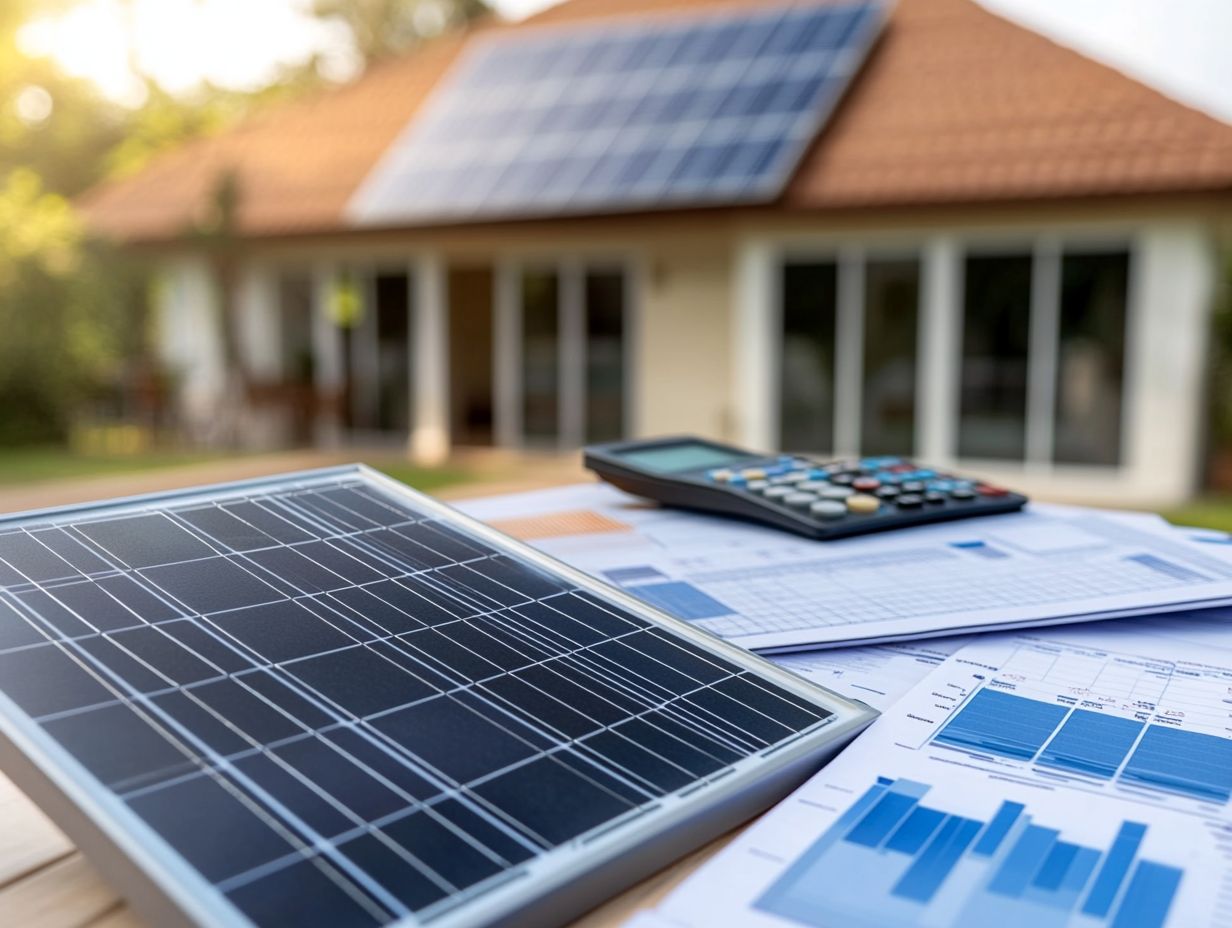
An overview of solar panel leasing options. Solar leases provide you with a smart alternative to finance solar panels without having to deal with those hefty upfront costs of buying the systems outright.
With a solar lease agreement, you can enjoy lower energy bills and all the perks of solar energy without the hassle of maintenance and other responsibilities that come with ownership.
It’s a win-win situation for homeowners and businesses alike!
Advantages and Disadvantages of Solar Leasing
Understanding the Financial Benefits of PPAs
When you’re thinking about solar leases, it’s crucial to weigh the pros and cons against outright purchasing solar panels. Leasing usually means lower upfront costs and no maintenance worries for the solar panels, but it might not offer some of the perks that come with ownership, like long-term financing options or potential tax credits for your solar energy investments.
If you decide to buy solar panels outright, you could see significant long-term savings on your energy bills, leading to greater financial security over time and enhancing your energy efficiency. Homeowners who invest in solar systems often take advantage of tax benefits and solar incentives that can help reduce the overall installation cost.
Of course, this approach does require a larger initial investment, which might be a dealbreaker for some. It’s important to think about your personal financial situation and how much flexibility you need.
Solar leasing can give you a more manageable monthly payment, without the headaches of maintenance or the stress of worrying about how well your equipment is performing.
Power Purchase Agreements (PPAs)
Power Purchase Agreements (PPAs) are a great option for financing your residential solar installation.
With a PPA, you pay for the energy produced instead of directly paying for the solar energy system itself. In this arrangement, a third-party provider takes care of installing and maintaining the solar arrays, so you can enjoy predictable energy costs and the potential for savings on your utility bills.
This arrangement benefits both parties significantly!
How PPAs Work and Benefits for Homeowners
Understanding how Power Purchase Agreements (PPAs) work can really help you make informed choices about your solar financing options and mitigate financing challenges. With a PPA, you get predictable energy costs and can enjoy significant financial benefits while also contributing to the growth of the solar energy market and supporting renewable energy initiatives.
In simple terms, a PPA is a contract between you and a solar provider that sets the terms for buying electricity generated from the solar panels installed on your roof, contributing to sustainable finance practices. It’s a win-win situation because you can skip the hefty upfront costs of solar installation and still enjoy lower electricity rates over time.
You’ll benefit from stable pricing and protection against those pesky rising utility rates. Plus, this arrangement can even give a nice boost to your credit score since making timely payments for energy helps build a reliable payment history.
By choosing PPAs, you contribute to renewable energy while bolstering your financial stability. It’s definitely a smart long-term investment!
Factors to Consider When Choosing a Financing Option
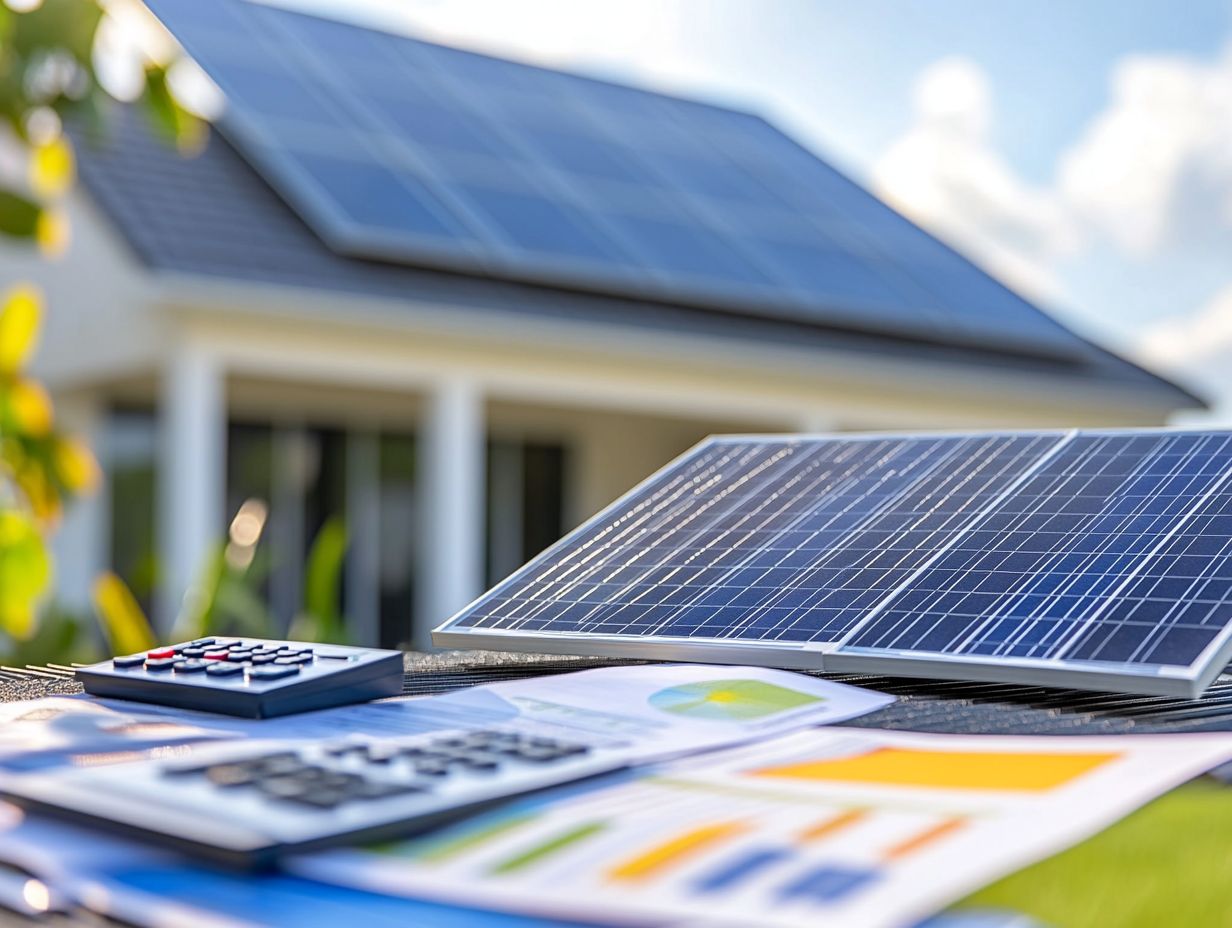
Choosing the right financing option for your solar installation means you’ll need to think carefully about a few key factors, such as installation costs and financing requirements.
Consider your budget, your eligibility for loans, interest rates, and the long-term cost-benefit analysis of solar energy systems.
By understanding these elements, you’ll be better equipped to make informed decisions that fit your financial goals and energy needs.
Cost, Ownership, and Long-Term Savings
When you’re evaluating solar financing options, it’s super important to look at the costs of the solar system, ownership models, and what kind of long-term savings you can expect. Each financing option—whether it’s a loan, lease, or Power Purchase Agreement (PPA)—carries different financial implications that can really affect your overall investment in solar energy.
The choice you make can influence not just your initial out-of-pocket expenses, but also the ongoing maintenance responsibilities and the tax benefits, like renewable energy credits, that come with ownership.
For example, if you go for a loan, you might face higher upfront costs, but it could unlock tax credits and incentives that really help lower your long-term expenses. On the flip side, leasing or a PPA might ease that initial financial burden, but you could end up with limited savings down the line because of those fixed monthly payments and the lack of ownership of the solar technology.
It is crucial to think about how these different structures will impact the overall cost-effectiveness and return on investment so you can make the best choice for yourself.
Essential Tips for Financing Solar Panels
Financing solar panels might feel a bit overwhelming at first, but don’t worry—you can totally maximize your savings and find the best deal that fits your energy needs.
By checking out different financing options for solar installations, along with some green financing choices, you can uncover significant savings and make your solar energy investment a success.
Maximizing Savings: Finding the Best Financing Deal
To really maximize your savings when financing solar panels, you’ll want to tap into all the solar panel incentives out there, like tax credits for solar installations, state rebates, and customer incentives. Understanding the federal solar tax credit can help you shave down your overall investment and steer you toward the best financing options.
On top of federal programs, you might find a treasure trove of local incentives and financial products from credit unions and banks for solar energy loans. For instance, some programs offer performance-based incentives where you can earn payments based on how much electricity your solar panels generate, contributing to positive cash flow.
Don’t forget that utility companies often have rebates for solar system installations, making your shift to renewable energy much more budget-friendly. Exploring financing options like solar loans, solar leases, and power purchase agreements (PPAs) can also boost your savings and improve your energy efficiency while making the switch to solar a breeze.
By effectively leveraging these resources, including solar incentives and government grants, you can significantly cut down on your upfront costs and enjoy long-term financial benefits, such as energy savings and reduced utility bills.
Cory, K., Coughlin, J., & Coggeshall, C. (2008). Solar Photovoltaic Financing: Deployment on Public Property by State and Local Governments. National Renewable Energy Laboratory. Link
Frequently Asked Questions About Solar Financing
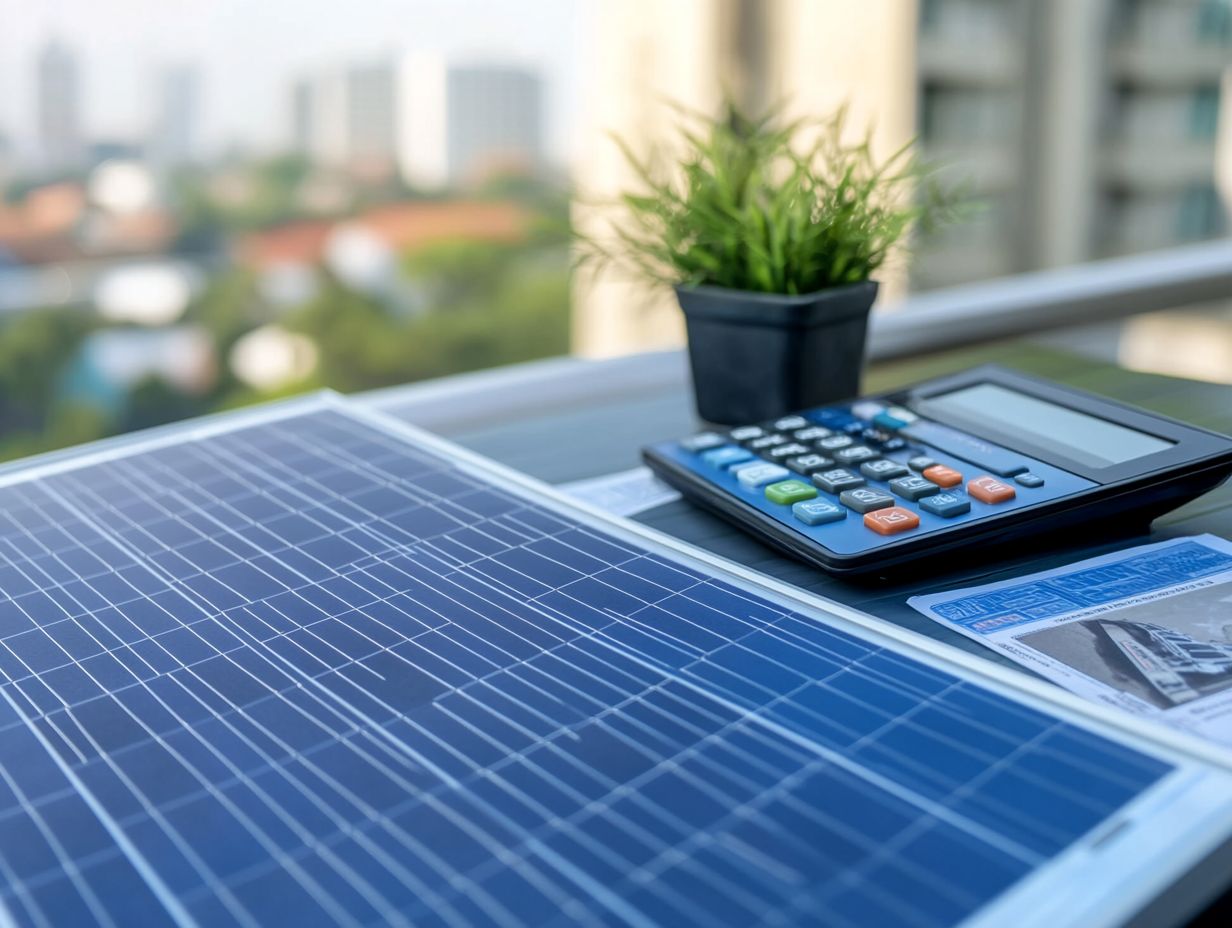
What is the best way to finance solar panels?
The best way to finance solar panels is through a loan, lease, or power purchase agreement (PPA). These solar financing options allow you to spread out the cost of solar panel installation over time, making it more affordable and enhancing your solar investment.
What is a solar panel loan?
A solar panel loan is a type of solar energy loan that allows you to borrow money to cover the solar installation costs. You will typically pay back the loan in monthly payments over a set period of time, with interest rates that may vary, and you will own the solar panels outright once the loan terms are fulfilled.
What is a solar panel lease?
A solar panel lease is a type of lease agreement in which you pay a monthly fee to use a solar power system that is owned by a third-party company. This option allows you to benefit from solar energy without covering the upfront costs of installation and maintenance. This enhances your cash flow and energy production.
What is a Power Purchase Agreement (PPA)?
A power purchase agreement (PPA) is a type of PPA agreement in which a solar energy provider installs and maintains a solar panel system on your property. You agree to purchase the electricity generated by the panels at a lower rate than your current utility provider, which aids in financing solar projects without upfront costs and improves your environmental impact.
Which financing option is best for me: loan, lease, or PPA?
The best financing option for you will depend on your individual financial situation and goals. A solar panel loan may be the best option if you want to own the panels outright and take advantage of available federal tax credits and other tax benefits. A lease or PPA may be a better option if you are looking for a more affordable, hands-off approach to solar energy leveraging different ownership models.
Do I need good credit to finance solar panels?
Generally, a good credit score is required for solar panel financing. However, some providers may offer options through financial institutions, credit unions, and other financing alternatives for those with suboptimal credit scores. It is important to shop around and compare offers from different companies to find the best solar business models for your financial situation.


